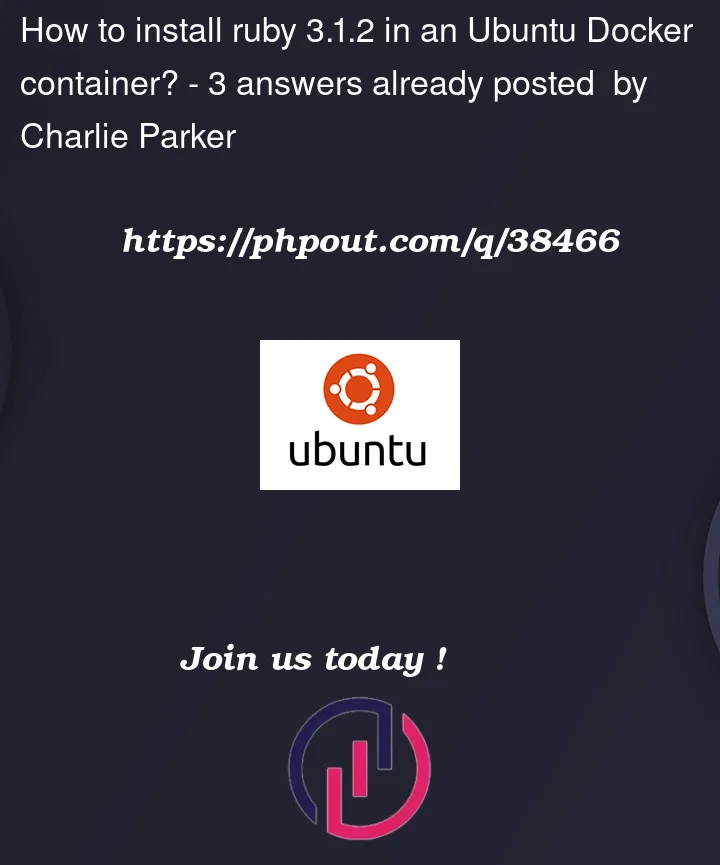I tried:
if ! command -v ruby &> /dev/null
then
# - proverbot's version
# First, install Ruby, as that is for some reason required to build
# the "system" project
# git clone https://github.com/rbenv/ruby-build.git ~/ruby-build
# mkdir -p ~/.local
# PREFIX=~/.local ./ruby-build/install.sh
# ~/.local/ruby-build 3.1.2 ~/.local/
# - u-pycoq's version
# sudo apt-get install ruby-full
sudo apt-get install rbenv
rbenv init
eval "$(rbenv init - bash)"
echo 'eval "$(rbenv init - bash)"' >> ~/.bashrc
sudo apt-get install ruby-build
# ruby-build 3.1.2
rbenv install 3.1.2
rbenv global 3.1.2
ruby -v
else
echo "Error: failed to install ruby"
fi
But I get my Ruby build is not up-to-date perhaps, but when I install it, it is up-to-date. Therefore, why is the proverbot’s attempt 3.1.2 if it doesn’t exist?
It was inspired from: https://superuser.com/questions/340490/how-to-install-and-use-different-versions-of-ruby
It seems it works with 2.7.1, but not with 3.1.2.
sudo apt-get install rbenv
rbenv init
eval "$(rbenv init - bash)"
echo 'eval "$(rbenv init - bash)"' >> ~/.bashrc
sudo apt-get install ruby-build
# mkdir -p ~/.local
# PREFIX=~/.local
# sh ~/ruby-build/install.sh
mkdir -p ~/.local
ruby-build 2.7.1 ~/.local
rbenv global 2.7.1
# ruby-build 2.3.1p112 ~/.local/
# ruby-build 3.1.2 ~/.local/
# rbenv global 3.1.2
ruby -v
bot@513314bdda2a:~/ruby-build$ ruby -v
ruby 2.7.4p191 (2021-07-07 revision a21a3b7d23) [aarch64-linux-gnu]
Main command that fails
I think this is the main command that fails after rbenv and ruby-build are installed:
rbenv install 3.1.2
with
ruby-build: definition not found: 3.1.2
See all available versions with `rbenv install --list.
If the version you need is missing, try upgrading ruby-build.
Might my version of Ubuntu be the issue?
I tried it in a different server outside my Docker container and Ruby works. In the Docker container it says it’s:
bot@513314bdda2a:~/ruby-build$ lsb_release -a
No LSB modules are available.
Distributor ID: Debian
Description: Debian GNU/Linux 11 (bullseye)
Release: 11
Codename: bullseye
Is that an issue?
I tried updating ruby-build
I ran sudo apt-get update then sudo apt-get upgrade ruby-build then mkdir -p ~/.local then ruby-build 3.1.2 ~/.local/ and the error is ruby-build: definition not found: 3.1.2
I tried a bunch of Ubuntu’s, but it failed
#!/usr/bin/env bash
# - Get the Ubuntu version for the Ubuntu image
#docker run -it --rm ubuntu:20.04 /bin/bash
docker run -it --rm ubuntu:18.04 /bin/bash
apt-get update && apt-get install -y lsb-release && apt-get clean all
lsb_release -a
#apt-get install git
apt-get update
apt-get upgrade ruby-build
apt-get install rbenv
apt-get install ruby-build
rbenv install 3.1.2
# - Get Ubuntu version for the 'miniconda3' Docker image
docker run -it --rm continuumio/miniconda3:latest /bin/bash
#sudo apt-get install lsb-release
#apt-get install lsb-release
apt-get update && apt-get install -y lsb-release && apt-get clean all
lsb_release -a
Output of ruby-build https://gist.github.com/brando90/8a40e83df107f5a915ba105d9fb0121c
$ ruby-build --definitions
1.8.5-p52
1.8.5-p113
...
The gist is that all 3.x.x are missing.
I tried updating ruby-build manually, but it failed
I did do:
git clone https://github.com/rbenv/ruby-build.git "$(rbenv root)"/plugins/ruby-build
then
git -C "$(rbenv root)"/plugins/ruby-build pull
Then I installed 3.1.2 with rbenv. It seemed to succeed, but then ruby --version doesn’t seem right(?).
bot@e3a50e4f740f:~$ rbenv install 3.1.2
To follow progress, use 'tail -f /tmp/ruby-build.20221207002433.1304.log' or pass --verbose
Downloading ruby-3.1.2.tar.gz...
-> https://cache.ruby-lang.org/pub/ruby/3.1/ruby-3.1.2.tar.gz
Installing ruby-3.1.2...
Installed ruby-3.1.2 to /home/bot/.rbenv/versions/3.1.2
bot@e3a50e4f740f:~$ ruby --version
ruby 2.7.4p191 (2021-07-07 revision a21a3b7d23) [aarch64-linux-gnu]
bot@e3a50e4f740f:~$ rbenv global 3.1.2
bot@e3a50e4f740f:~$ ruby --version
ruby 2.7.4p191 (2021-07-07 revision a21a3b7d23) [aarch64-linux-gnu]
Option: Official rbenv instructions
Alas, that didn’t work :frowning:
$ rbenv install 3.1.2
rbenv: no such command `install'
I did:
mkdir ~/.rbenv
cd ~/.rbenv
git clone https://github.com/rbenv/rbenv.git ~/.rbenv
echo 'eval "$(~/.rbenv/bin/rbenv init - bash)"' >> ~/.bashrc
bash
# exec $SHELL
rbenv install 3.1.2
Using the official instructions: Seamlessly manage your app’s Ruby environment with rbenv, Basic Git Checkout
Is it probably best to use a Ruby Docker container? But how do I get one with the specific version I want 3.1.2 (or any specific version)?
An idea for a bounty: force insert the FROM ruby:3.1.2 image into running container
I still can’t install Ruby on a already-running container :(, is it possible to layer on top of the running image the ruby 3.1.2 image into the running container?
References:
- Crossposted: Why can’t I install Ruby 3.1.2 in a Linux Docker container?
- All attempts are documented at ruby_install_ubuntu.sh – the Discord channel for Ruby was really helpful, even though we didn’t solve it: https://discord.com/channels/518658712081268738/650031651845308419




3
Answers
This doesn't work on an Ubuntu Docker container which is the title of the question, but it at least worked on the HPC with Ubuntu I was using, so it can still be useful for future readers, a real answer on an Ubuntu Docker container is still needed and wanted.
Given the giant effort I’ve put so far, I think the best is just to rebuild the Docker image from scratch, starting from all the Docker images you need. For me I need to start from these:
But rebuilding the image, I tested to see if the right Ruby image was available once I started the Ruby 3.1.2 container (if you want a different one, I assume going to the Docker website for Ruby works or try different version tags or do latest). Output:
You can use
rvminstead ofrbenv.website: https://rvm.io. it works on docker.
here are the commands for ubuntu docker image